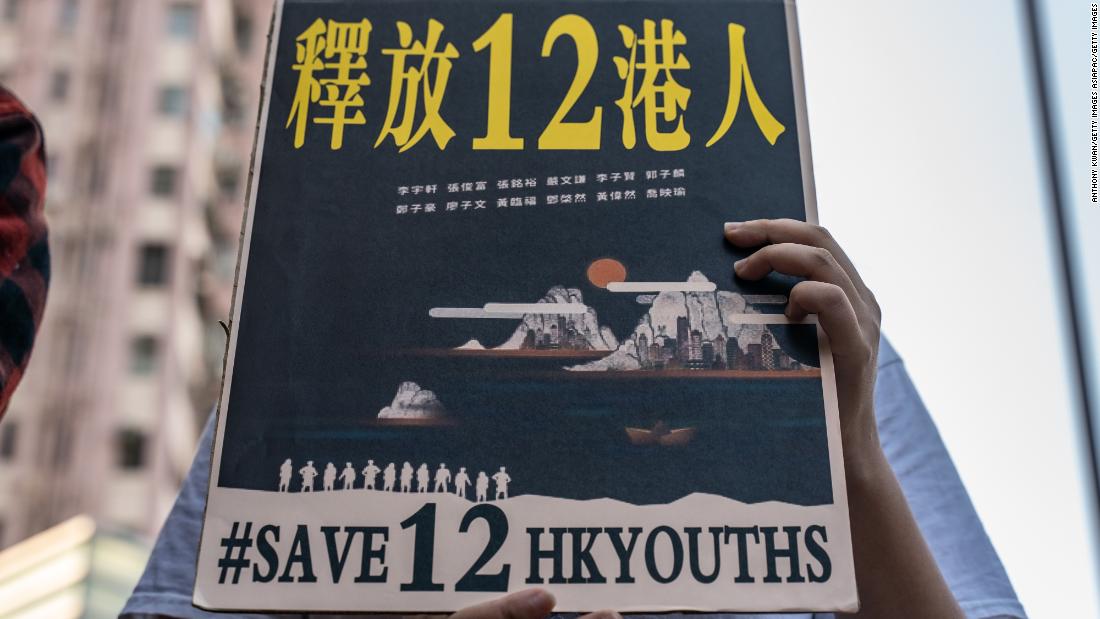
Two convicts for organizing the illegal border crossing were sentenced to two and three years in prison, respectively. The other eight were convicted of participating in the border crossing and all received seven-month sentences. The Yantian People’s Court said the ten pleaded guilty. All defendants also received fines ranging from $ 1,500 to $ 3,000.
Earlier Wednesday, China handed over to Hong Kong police two suspects under the age of 18 who were also on the boat. Authorities in the southern city of Shenzhen said they had confessed to crossing the border illegally but had not been charged.
The 12 were detained for more than 100 days before this week’s trial in Shenzhen, while their parents and politicians in Hong Kong, the United States and the United Kingdom pressed for their release. A group representing the families of the defendants said their loved ones were abused in Chinese custody and denied access to their lawyers.
Shenzhen police and prosecutors have previously denied allegations of ill-treatment and said the 12 had access to legal advice, although the practice in mainland China of denying defendants their chosen lawyer by appointing a government-chosen lawyer has been well documented in the past.
On Monday, a U.S. State Department spokeswoman urged Beijing to release the 12 and allow them to leave the country, adding that their “alleged” crime “was fleeing tyranny.”
“The treatment by the PRC authorities of these 12 people, some of whom are minors, has been appalling,” the spokeswoman said. “The Beijing authorities are continuing their campaign to erase the remaining rights and freedoms of the people of Hong Kong, falsely equating their system of government by party decree with the rule of law.”
The fate of the twelve activists has attracted considerable attention both in Hong Kong and abroad, emblematic of the worsening of political freedoms and the city’s climate since the approval earlier this year of a new national security law. The law – imposed on the city by Beijing, which ignores Hong Kong’s semi-democratic legislature – criminalizes secession, subversion and collusion with foreign forces, and has already had a gruesome effect on politics and debate.
Chung reportedly tried to flee the city in October seeking asylum at the U.S. consulate, but was withdrawn.
Escape routes have been narrowed continuously this year, exacerbated by closures and closures around the world as a result of the coronavirus pandemic. What had been a viable, albeit risky, sea route to Taiwan was closed once the Chinese Coast Guard made it clear they were monitoring the city’s waters.
Carrie Lam, the city’s Beijing-appointed chief executive, has refuted any suggestion that the Hong Kong government was aware of or involved in the case before the 12’s arrest.
The fugitives had “chosen to flee and, in the course of fleeing, entered another jurisdiction and have committed a crime of illegal entry elsewhere,” he said in October. “They have to deal with the legal consequences in this jurisdiction. It’s as simple and straightforward as that.”
The potential to face prosecution in China was a major source of opposition to an extradition bill that sparked protests last year, and the fate of the twelve appears to have confirmed many of the concerns that were felt in Hong Kong. Activists were denied access to adequate legal representation and little information was offered about their status.
Chinese courts, along with prosecutors and police, are overseen by the powerful Central Political and Legal Affairs Commission of the Chinese Communist Party and its local branches.
In a statement, Amnesty International’s Asia-Pacific Regional Director, Yamini Mishra, said the sentences “were carried out after an unfair trial exposed the dangers facing anyone on trial under the criminal justice system.” Chinese “.
“Chinese authorities have shown the world once again that political activists will not receive a fair trial,” he added.